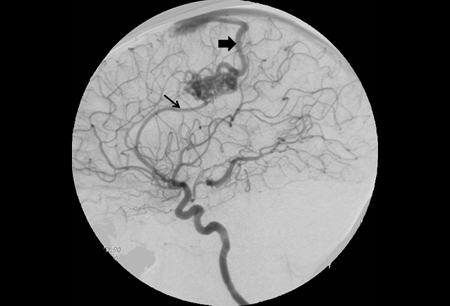Summary
Definition
History and exam
Key diagnostic factors
- sudden-onset focal neurologic deficit
- seizures
- reduced conscious level
Other diagnostic factors
- sudden-onset headache
- nausea
- vomiting
- confusion
- gradual-onset headaches
- hypertension
- coma
- gradual-onset focal neurologic deficit
- cognitive dysfunction
Risk factors
- familial (malformation)
- previous hemorrhages (risk of hemorrhage)
- drug abuse (risk of hemorrhage)
- abnormal venous drainage (risk of hemorrhage)
- small AVMs (risk of hemorrhage)
- posterior fossa and deep AVMs (risk of hemorrhage)
- coexisting aneurysms (risk of hemorrhage)
- pregnancy (risk of hemorrhage)
- hypertension (risk of hemorrhage)
Diagnostic tests
1st tests to order
- brain CT
- brain MRI
Tests to consider
- brain digital subtraction angiogram
- brain CT angiogram
- brain magnetic resonance angiogram
- CBC
- clotting screen and group
- electrolyte panel
- drug toxicology screen
- functional imaging
- superselective Wada
- neuropsychology
- perfusion studies
- electroencephalogram
- visual fields
Emerging tests
- 4D CT angiography (CTA)/magnetic resonance angiography (MRA)
Treatment algorithm
associated hematoma if significant mass effect
not surgical candidate
surgical candidate
pregnant
Contributors
Authors
Mervyn Lim, MBBS, MRCS, MPH
Senior Resident
Department of Neurosurgery
National University Health System
Singapore
Disclosures
ML declares that he has no competing interests.
Leonard Yeo, MBBS, MRCP, MMed, ASN
Senior Consultant
Department of Medicine (Neurology)
National University Health System
Assistant Professor
Yong Loo Lin School of Medicine
National University of SIngapore
Singapore
Disclosures
LY declares that he has no competing interests.
Benjamin Tan, MBBS, MRCP, MMed
Associate Consultant
Department of Medicine (Neurology)
National University Health System
Singapore
Disclosures
BT declares that he has no competing interests.
Adriel Leong, MBBS, MRCS
Senior Resident
Department of Neurosurgery
National University Health System
Singapore
Disclosures
AL declares that he has no competing interests.
Audrey Tan, BSc Medical Sciences (Hons), MBChB, MRCS
Senior Resident
Department of Neurosurgery
National University Health System
Singapore
Disclosures
AT declares that he has no competing interests.
Pervinder Bhogal, MBBS
Consultant
Department of Radiology
St Bartholomew's and The Royal London Hospital
London
UK
Disclosures
PB declares that he has no competing interests.
Yang Cunli, MBBS, FRCR, MMed, FAMS
Senior Consultant
Department of Diagnostic Imaging
National University Health System
Assistant Professor
Yong Loo Lin School of Medicine
National University of Singapore
Singapore
Disclosures
YC declares that he has no competing interests.
Anil Gopinathan, MBBS, MD, DNB, FRCR, FAMS
Head of Division of Interventional Radiology
Senior Consultant
Department of Diagnostic Imaging
National University Health System
Assistant Professor
Yong Loo Lin School of Medicine
National University of Singapore
Singapore
Disclosures
AG declares that he has no competing interests.
Acknowledgements
Dr Leonard Yeo, Dr Benjamin Tan, Dr Adriel Leong, Dr Audrey Tan, Dr Mervyn Lim, Dr Pervinder Bhogal, Dr Yang Cunli, and Dr Anil Gopinathan would like to gratefully acknowledge Dr Charles Matouk, Dr Catherine E. Gilkes, and Dr Richard J. Edwards, previous contributors to this topic, and the additional contribution of Dr Branden Cord and Dr Ryan Hebert.
Disclosures
CM, CEG, and RJE declare that they have no competing interests.
Peer reviewers
Bernhard Meyer, MD
Chairman
Professor of Neurosurgery
Department of Neurosurgery
Technical University of Munich
Munich
Germany
Disclosures
BM declares that he has no competing interests.
Michael Chen, MD
Assistant Professor of Neurology
Neurosurgery and Radiology
Rush University Medical Center
Chicago
IL
Disclosures
MC declares that he has no competing interests.
Jae H. Choi, MD
Research Director
Stroke Center/The Neurological Institute
Columbia-Presbyterian Medical Center
New York
NY
Disclosures
JHC declares that he has no competing interests.
Peer reviewer acknowledgements
BMJ Best Practice topics are updated on a rolling basis in line with developments in evidence and guidance. The peer reviewers listed here have reviewed the content at least once during the history of the topic.
Disclosures
Peer reviewer affiliations and disclosures pertain to the time of the review.
References
Key articles
Al-Shahi R, Warlow C. A systematic review of the frequency and prognosis of arteriovenous malformations of the brain in adults. Brain. 2001 Oct;124(Pt 10):1900-26.Full text Abstract
Spetzler RF, Martin NA. A proposed grading system for arteriovenous malformations. J Neurosurg. 1986 Oct;65(4):476-83. Abstract
Greenberg SM, Ziai WC, Cordonnier C, et al. 2022 Guideline for the management of patients with spontaneous intracerebral hemorrhage: a guideline from the American Heart Association/American Stroke Association. Stroke. 2022 Jul;53(7):e282-361.Full text Abstract
Derdeyn CP, Zipfel GJ, Albuquerque FC, et al. Management of brain arteriovenous malformations: a scientific statement for healthcare professionals from the American Heart Association/American Stroke Association. Stroke. 2017 Aug;48(8):e200-24. Abstract
Zuurbier SM, Al-Shahi Salman R. Interventions for treating brain arteriovenous malformations in adults. Cochrane Database Syst Rev. 2019 Sep 10;9(9):CD003436.Full text Abstract
Reference articles
A full list of sources referenced in this topic is available to users with access to all of BMJ Best Practice.

Differentials
- Cerebral aneurysm
- Cavernous hemangioma
- Dural arteriovenous fistula
More DifferentialsGuidelines
- Guidelines for the management of spontaneous intracerebral hemorrhage
- Clinical practice guidelines for management of brain arteriovenous malformations in eloquent areas
More GuidelinesPatient information
Stroke: treatment
More Patient informationLog in or subscribe to access all of BMJ Best Practice
Use of this content is subject to our disclaimer